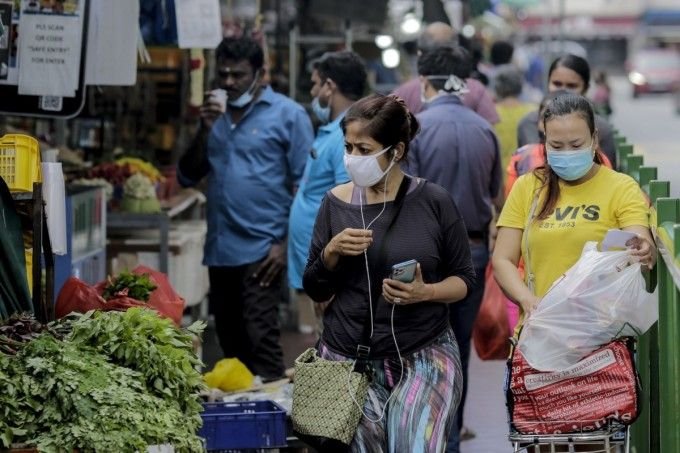
Dual war in Singapore 5
Eight weeks of blockade, strict quarantine and strict social distancing regulations have helped Singapore gradually control the pandemic.
6 months since the first patient was recorded, the epidemiological situation in Singapore has gradually stabilized.
The majority of patients today are still concentrated in crowded immigrant labor areas (300,000 people), with low living standards and income.
The country recorded a total of more than 48,000 positive cases of nCoV, 92% of which have recovered.
The authorities introduced aggressive measures targeting local communities and migrant workers.
Singaporeans wear masks when going to the market, July 21.
In April, the country issued an 8-week blockade regulation.
On top of that, Singapore also increased testing capacity and added hospitals to treat people with Covid-19, including mild and asymptomatic patients.
At the same time, dengue fever broke out here.
NEA also warned that the number of dengue fever cases this year is expected to exceed 22,000 – the record threshold recorded in 2013.
Last week, authorities in this country announced tough penalties for households and businesses that leave stagnant water in their homes or production facilities, creating conditions for mosquitoes to breed and develop.
Many experts believe that the strict blockade measures to suppress Covid-19 are the cause of the dengue epidemic becoming more severe.
Dr. Siti Nadia Tarmizi, director of the Institute of Infectious and Zoonotic Diseases, also agreed with this opinion.
Normally, dengue fever peak season lasts from June to October.

Community service workers spray mosquito repellant in a residential area in Singapore, July 13.
`Any dengue cluster should be considered a major public health hazard,` said Ooi Eng Eong, deputy director of the emerging infectious diseases emergency program, Duke-NUS Medical School
While the epidemic is still raging in some countries such as the US, Brazil, and India, the second wave of Covid-19 is also a major concern of the government.
The possibility of a second wave depends largely on the government’s ability to control new infections.
`Currently, the government and health officials have gained profound experience, through 4 months of controlling the epidemic and preventing infection clusters in concentrated housing areas,` he said.
However, `cleaning up` pathogens in labor dormitories is still a big challenge.
Speaking to the press on July 17, he said the country is testing workers in clusters, ensuring that those with negative results are quarantined for 14 days.



